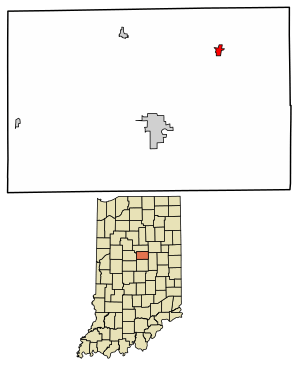Windfall, Indiana facts for kids
Quick facts for kids
Windfall, Indiana
|
|
|---|---|
|
Town
|
|

Location of Windfall City in Tipton County, Indiana.
|
|
| Country | United States |
| State | Indiana |
| County | Tipton |
| Township | Wildcat |
| Founded by | James B. Fouch |
| Area | |
| • Total | 0.41 sq mi (1.05 km2) |
| • Land | 0.41 sq mi (1.05 km2) |
| • Water | 0.00 sq mi (0.00 km2) |
| Elevation | 866 ft (264 m) |
| Population
(2020)
|
|
| • Total | 696 |
| • Density | 1,718.52/sq mi (663.28/km2) |
| Time zone | UTC-5 (Eastern (EST)) |
| • Summer (DST) | UTC-4 (EDT) |
| ZIP code |
46076
|
| Area code(s) | 765 |
| GNIS feature ID | 2397748 |
Windfall is a small town in Tipton County, Indiana. It is located in Wildcat Township. Windfall is part of the larger Kokomo area. In 2021, about 697 people lived there.
Contents
A Look Back: Windfall's History
How Windfall Began
Windfall was started in 1853 by a man named James B. Fouch. He planned the town hoping to get a train station. This would help businesses that traded lumber. Fouch built the first sawmill (a place to cut wood) in 1853.
A Christian church was built near Windfall in 1854. Its members moved the church into Windfall in 1866. A Methodist church also started in Windfall in 1857. They held their meetings in a school building. The Windfall post office has been open since 1855.
No one knows for sure how Windfall got its name. But in 1949, James B. Fouch's niece shared a story. She said her uncle named the town after a huge windstorm. This storm had swept through the village.
The village officially became a town on March 24, 1871. Everyone who lived there voted for it. As more people moved in, the town grew differently than Fouch planned. Because of this, Windfall's Main Street, which was the first street, is now southwest of the town's center. The Windfall Baptist church was also founded that same year.
Windfall in the 1900s
By the early 1900s, Windfall was known as a very nice community in Tipton County. A large Methodist church was finished in September 1913. It cost $28,000 to build.
Windfall During World War II
From 1944 to 1945, Windfall was home to a special camp. It was a POW (Prisoner of War) camp for German soldiers during World War II.
Famous People from Windfall
Jeff Modisett, who was Indiana's Attorney General from 1997 to 2000, grew up in Windfall.
Where is Windfall? Geography
Windfall covers about 0.29 square miles (0.75 square kilometers) of land. There is no water area within the town.
Who Lives in Windfall? Demographics
| Historical population | |||
|---|---|---|---|
| Census | Pop. | %± | |
| 1880 | 570 | — | |
| 1890 | 561 | −1.6% | |
| 1900 | 957 | 70.6% | |
| 1910 | 899 | −6.1% | |
| 1920 | 801 | −10.9% | |
| 1930 | 734 | −8.4% | |
| 1940 | 835 | 13.8% | |
| 1950 | 963 | 15.3% | |
| 1960 | 1,135 | 17.9% | |
| 1970 | 946 | −16.7% | |
| 1980 | 911 | −3.7% | |
| 1990 | 779 | −14.5% | |
| 2000 | 712 | −8.6% | |
| 2010 | 708 | −0.6% | |
| 2020 | 696 | −1.7% | |
| U.S. Decennial Census | |||
Windfall's Population in 2010
In 2010, there were 708 people living in Windfall. These people lived in 279 households, with 190 of them being families. The town had about 2,441 people per square mile.
Most people in Windfall (97.2%) were White. A small number were African American, Native American, or Asian. About 5.4% of the population was Hispanic or Latino.
About 33.7% of households had children under 18. Many households (52.7%) were married couples. The average household had 2.54 people. The average family had 3.10 people.
The average age in Windfall was 38.8 years old. About 25.4% of residents were under 18. About 15.5% were 65 or older. The town had slightly more females (50.6%) than males (49.4%).
Making a Living: Windfall's Economy
Early Businesses (1800s)
After James B. Fouch built the first sawmill, Josiah Ross built the first house. He used it as a general store (a store selling many different things). By 1859, several storehouses were built. They bought and sold products like grain using the railroad. A factory that made staves (wooden strips for barrels) was built in 1865. In 1873, the Windfall Steam Flouring Mill started. Another factory, which made felloes (parts of a wheel), was built in 1877.
Main Industries in the 1900s
By 1914, the most important business in Windfall was canning food, especially tomatoes. The Royal Canning Company was the biggest cannery (a factory that cans food).
Town Services: Infrastructure
Utilities and Power
In the past, the Windfall Gas Company provided natural gas to the town. In 1913, the Indian Union Traction Company started supplying Windfall with electric lighting.
Healthcare in Windfall
In 1914, Windfall had its own hospital. However, it has since closed down.
Learning in Windfall: Education
Windfall has a public library. It is a part of the Tipton County Public Library system.
See also
 In Spanish: Windfall City (Indiana) para niños
In Spanish: Windfall City (Indiana) para niños
 | Sharif Bey |
 | Hale Woodruff |
 | Richmond Barthé |
 | Purvis Young |

